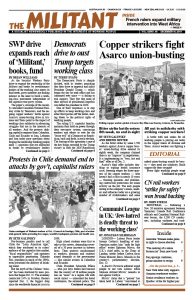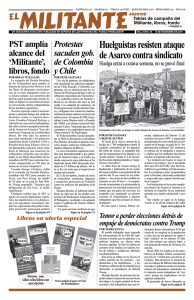Iraqi Prime Minister Adel Abdul-Mahdi announced his resignation Nov. 29 after nearly two months of mass anti-government protests have shaken the country. The youthful demonstrators are demanding an end to the effects of the economic crisis — joblessness, lack of electricity and basic resources — and an end to interference in Iraq by Tehran and Washington.
The Iraq protests are part of a broader uprising shaking Iran and Lebanon, as working people seek to assert their interests in the midst of ongoing wars in the region and the battle for sway between the capitalist rulers in the U.S. and Iran.
Mahdi’s resignation followed the brutal slaughter of over 25 protesters in Nasiriyah, capital of Dhi Qar province. When protests began there Nov. 27, Mahdi told army brass to establish military-led “crisis cells” to quell the uprising. Staff Gen. Jameel al-Shammari — notorious for leading murderous attacks on protesters in Basra last year — was assigned to this area.
Shammari’s forces opened fire on protesters, killing and wounding dozens. They were joined in the attack by Shiite militias beholden to Tehran. Amnesty International described the scene as like “a warzone,” where “Iraqi security forces meted out “appalling violence against largely peaceful protesters.” Large crowds gathered for the funerals the next day.
As word spread, protests took place across the country. Previously the demonstrations had been centered in Shiite areas in Basra, Baghdad and southern Iraq. After the killings in Nasiriyah, they spread across the country, in areas both predominantly Shiite and Sunni.
Protesters vowed to stay in the streets. “We want to change everything,” 28-year-old protester Ali Dabdab told the Washington Post in Baghdad. “This resignation is only step one, but it’s not what we came for. We want our country back.”
Iraq’s Grand Ayatollah Ali al-Sistani called for Mahdi to step down. Mahdi’s resignation was accepted by Iraq’s parliament Dec. 1. He will remain in office during efforts to form a new government. This can take weeks, as the government structure is built around three top posts assigned to representatives of Shiite, Sunni and Kurdish groups.
Iraq’s judiciary announced Dec. 1 a travel ban and arrest warrant against Shammari.
Shiite cleric Muqtada al-Sadr, who has given support to the demonstrations, challenged the efforts to form a new government by the usual methods. “The next candidate for prime minister should be chosen by popular referendum,” he said.
Protesters say these steps will not satisfy their demands — for the fall of the entire corrupt “political class” that has dominated Iraq since Washington overthrew the rule of Saddam Hussein 16 years ago.
Broader uprisings in region
Iraq continues to be a flashpoint in the breakdown of the war-torn imperialist-imposed disorder in the Middle East. The Iraqi people have undergone long years of military conflicts and repression, from the U.S.-led assault in 1991 and Washington’s invasion in 2003, to the brutal occupation of Sunni areas by reactionary Islamic State forces. Tehran has taken advantage of this to extend its political and military influence.
Since the start of October, over 400 people have been killed in attacks on the protesters.
In one of his regular visits to Baghdad, Iranian Revolutionary Guard Quds Force chief Gen. Qassim Soleimani, head of the Iranian rulers’ counterrevolutionary interventions abroad, boasted to Iraqi military leaders Oct. 30, “We in Iran know how to deal with protests.”
Iran itself has been convulsed by hundreds of thousands protesting in mid-November, triggered by fuel price hikes. But the actions rapidly challenged the diversion of much of the country’s revenue to the clerical regime’s funding of its counterrevolutionary Guard and proxy militia forces from Iraq and Lebanon to Syria, Gaza and Yemen. The economic crisis in Iran has been intensified as oil exports have been choked off through Washington’s latest economic sanctions.
The Iranian Interior Ministry admitted that over 200,000 working people, often from poorer areas with higher unemployment, took part in these nationwide demonstrations, the biggest in years.

